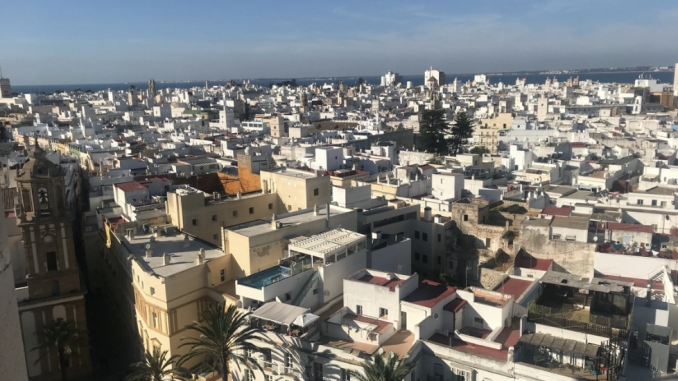
The year abroad is rightly advertised as the highlight of a Modern Languages degree. With endless options to choose from, it can be confusing to someone who is looking at a languages degree to discern what they want from a university in terms of their Study Abroad opportunities. In this blog post, I’m going to explain a little bit about how it all works at King’s and tell you about some of my experiences of my year abroad so far.
I chose to split my year between studying and a work placement so that I could experience living in both Spain and a Latin American country. For my first Semester, I’m based at the University of Cádiz in the very southwest of Spain. For the second, I’ll be undertaking a work placement in Bolivia – but I’m yet to live there, so unfortunately, I can’t tell you about my experiences on a work placement!
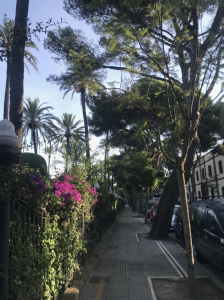
Your options:
As I mentioned, it’s possible to split your Year Abroad into two semesters at King’s. I’m studying a Joint honours course and only one of my subjects is a language, but if I were studying two languages, for example Spanish and Portuguese, I would have to spend time in both a Spanish-speaking and Portuguese-speaking country (there are exceptions for native speakers!) In terms of the kind of things that you can do on your Year Abroad, you have three options: study at one of King’s partner universities (of which King’s has many all around the world – one of the things that I was particularly impressed by when I applied to King’s), undertake a work placement, (this can be paid or unpaid, but you would have to find this yourself), or teach as a language assistant with the British Council, (this is paid.)
I chose to both study and work because I knew that I wanted to have the experience of going to university in another country, but I also knew that a work placement in a field related to something that I want to do after university would be beneficial to me career-wise. I also chose to go to Spain first, because I thought that it would be easier to adjust to living abroad for the first time if it was slightly closer to the UK – although I had experienced living away from home before when I moved to London from Bristol, but living in a foreign country is a completely different experience. In terms of the modules that you can take, you can take anything within the department that King’s is connected to as long as it’s in Spanish – so for SPLAS at King’s, that’s Filosofía y Letras at Cádiz. I’ve taken this opportunity to take an Arabic language module, an Arabic literature module, and a pretty interesting humanities module called Pensamiento y Civilización en el Mundo Contemporáneo, which touches on some of the Philosophy topics that I covered in 1st and 2nd year at King’s. In addition to these, I do a module on Narrative Spanish literature and one on the Hispano-American literary tradition.
It’s worth saying that many universities – including UCA – offer language courses which are discounted for exchange students. I did not choose to do one, but these can be a fantastic way to become friends with other students and get more comfortable with talking in Spanish if you started it ab initio at King’s, for example.
The logistics:
Funnily enough, everything that could have gone wrong during this first half of my year abroad did seem to go wrong! As a consequence of Brexit, there was a huge waiting list for students to get visas for Spain, as previously they were not needed, but our year was the first year when they became a requisite. This resulted in a lot of back and forth travelling– I had to fly back to the UK for a visa appointment at the Spanish consulate nine weeks after having requested for one. This was made more complicated by a technical mix-up on the part of Global Mobility, who had managed to send my application for Cádiz to the wrong email address, meaning that I did not have confirmation that I could come to Cádiz until the month I came here. So, from a logistical standpoint, my experience included a lot of chasing people and being quite insistent on getting things done. But on a positive note, it has been a huge life lesson in self-advocating and understanding that stress is not always productive – sometimes things work themselves out.
Student life:
Some of the best things about coming to Spain have been the people I’ve met and the places I’ve managed to visit. Exchange students have a funny habit of sticking together, which means that my friend group is incredibly diverse – from Brits to Germans to Italians to Americans to Mexicans. Some people say that they actually find it difficult to meet Spanish people – in my experience this is both true and false. I’ve managed to make Spanish friends through my classes, and Spanish students can also take part in an exchange programme within Spain, backed by Erasmus funding, which means that they often socialise with international exchange students too. In fact, Cádiz is a quite popular destination for Spanish students since it’s warm and has some great beaches. But it’s definitely true that there is an exchange student bubble within the existing student bubble of the city.
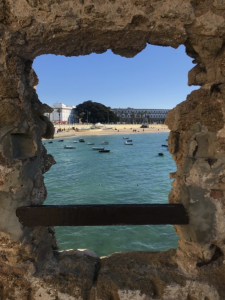
I chose to live in a shared-flat which I found through a Facebook page – after posting a little request on the platform, someone reached out to me, and we had a video call before I decided that I would move in. It honestly sounded pretty sketchy at first, but it ended up being one of the best parts of my life here! My flatmates are all other exchange students, the majority of them from Germany, and it’s an experience similar to living in student halls in the sense that there is always something to do.
The best things about Cádiz are probably the weather and the easiness in accessing different parts of the city. The temperature does not go far below 10 degrees for the whole winter, and the summers are slightly more comfortable than in inland Andalusian cities like Sevilla and Córdoba, which can get quite hot. Because the city is almost an island and pretty much all of the students live in the Casco antiguo, it’s never too difficult to get from place A to B. It’s true that Cádiz is pretty small – there are only 2 nightclubs – but the nightlife doesn’t seem to suffer. There is more of a bar culture, and lots of places open up dance floors later on in the evening, which means you can go out without paying club entry – there is a particularly famous bar here called Evohé, which is a hotspot for students and locals alike. And though it’s arguably too cold to swim in the sea in the winter, there are sunny days which mean you can essentially sunbathe year-round. Another thing worth noting is that the sunsets here are undoubtedly the best in Spain, which makes the beaches an excellent choice for a pre-drinks location.
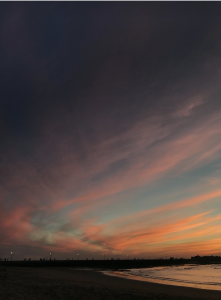
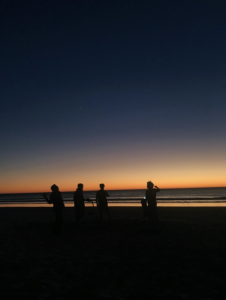
In my time here, I’ve tried to take every opportunity to see other parts of Spain. Having friends from universities in other parts of Spain has meant that I’ve been able to visit Córdoba and Barcelona fairly easily – both cities which I loved. I’ve also made the effort to visit other cities like Málaga, Jerez de la Frontera, and Sevilla. I even went on a day trip with my flatmates to the Caminito del Rey, organised by an Erasmus group called Yeah Cadiz. You can really travel quite cheaply in this part of Spain – either by train, or car-share apps like BlaBlaCar (it is like Uber pool for longer distances!)
Overall, my experience in Cádiz has been everything I hoped for and more. I’ve made so many friends and as cliché as it sounds, have learnt a lot about myself – including that I do actually like Reggaeton! In terms of my language ability, I was convinced that I hadn’t improved much, but when I did a language level test, I surprised myself to find that I had moved up a whole bracket within just three months of living here. Being made to speak Spanish on a daily basis really pushed the needle and helped me get over a block that I had been facing with my language learning. Strangely, I was the only student to come to Cádiz this semester from King’s, but I really think it’s a hidden gem.

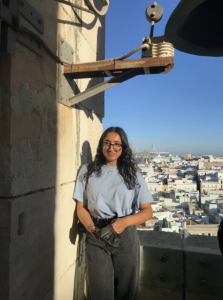
Leave a Reply